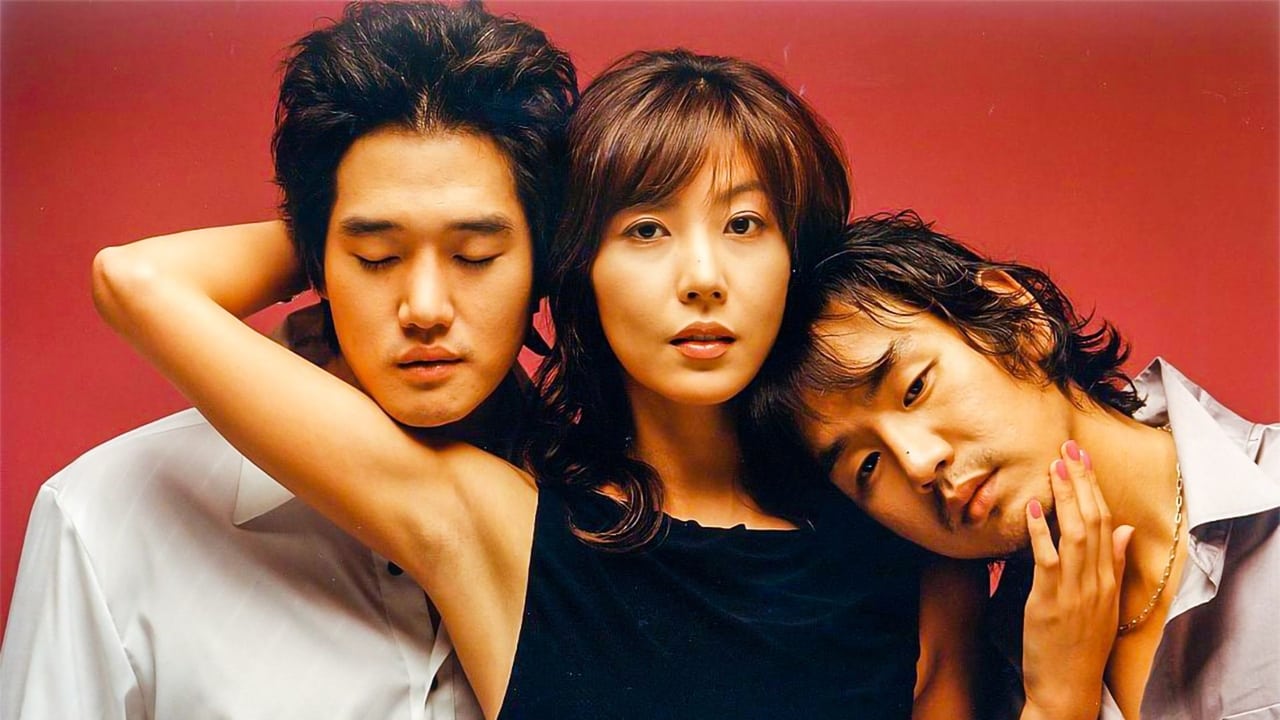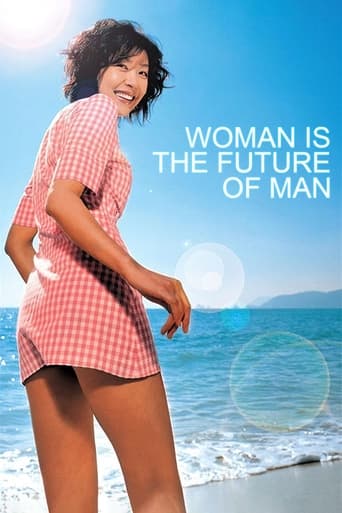Pluskylang
Great Film overall
pointyfilippa
The movie runs out of plot and jokes well before the end of a two-hour running time, long for a light comedy.
Geraldine
The story, direction, characters, and writing/dialogue is akin to taking a tranquilizer shot to the neck, but everything else was so well done.
Justina
The film never slows down or bores, plunging from one harrowing sequence to the next.
adrean-819-339098
It has been a couple of years that I heard the name Hong Sangsoo and of his reputation. I'm a fan of Eric Rohmer and to have somebody follow in his tradition with glowing reviews immediately compelled me to seek out his films. His films aren't the easiest to come by so I immediately grabbed this film when I saw it.I was not the slightest bit disappointed.There was certainly an ethereal quality to this film and an indefinable stamp of a director unto himself. The decors are simple and not manipulated but at the same time there is a depth and simplicity in each shot. There is such a control of what we the viewer can see and what is not shown. The relationships are complex and real. The tension is palpable in several scenes. My heart really went out to the characters during the course of the film. I even had a change of heart. I didn't feel manipulated by the nature of the characters but I felt free to choose. A second viewing might be rewarding to see another perspective.In contrast to others I found the soundtrack unique and appropriate. I also appreciate that, like Rohmer, there is humor throughout the film.This film has revitalised my opinion on Korean cinema which I had a pretty dire view on before (I lived there a few years ago). I also have a new director forefront in my mind whom I must discover more of.
jzappa
A story has a beginning, a middle, and an end: This comes from Aristotle, and it splendidly describes a great many stories from the European narrative tradition, but it doesn't describe all stories. It is very Western to stress the end, on where the story goes, the destination. It means progression or change in time, but when removing yourself to observe the composition of a story, what if interims and languid moments between characters, or one character, equipped it with its expression?There are two basic kinds of good movies. One is a movie where you leave saying, "I don't under, wait, yeah, of course, now I understand! What a masterpiece! Let's go find a party," and by the time you wake up the next day, it is possible you are no longer thinking of it at all. Then, there is a movie that is upsetting or intricate or unusual, and you leave unsure, but you think about it the next day, or off and on for a week, or off and on forever. That is because that kind of film, which for instance aside from this film includes Nil By Mouth, No Country For Old Men, Brick, or any given John Cassavetes movie, is not clean or neat. There is something about it that comes purely from the heart, and so, it goes to the heart.The story orbits droopily roundabouts two old pals, a university art teacher played by Yu Ji- Tae, who was the delightfully unusual villain in Oldboy, and Kim Tae-Boo playing a graduate from an American film school who has recently returned to his home country. As they have dinner in a restaurant, and Hong Sang-soo directs these two actors so that the painful awkwardness between them is realistically implacable, Tae-Boo talks Ji-Tae into fixing up a reunion between them and his old girlfriend, Seong Hyeon-ah. But, unbeknownst to Tae-Boo, Ji-Tae had grown to be drawn into a relationship with her following Tae-Boo's career-driven exodus to the US. Unlike the two men, she has no buried intention to compensate for or hold on to days gone by, not just for the reason that it's upsetting, but also because she is altogether here and now. The three shortly gather for a night of drinking, although ultimately, the film doesn't show any emotional culmination or yet still arrive at an apparent close. But that's your call when you see it.The film was screened alongside another South Korean film, a magnificent one, Oldboy, at Cannes, marking the first time that two films from the country were in the competition simultaneously. Unlike Oldboy, Woman Is the Future of Man did not win any of the awards and reportedly met with an indifferent reception, which to me is strange. I don't find it to be a discouraging element to making the decision to see a movie, because that is a reaction that is highly unusual. It is not a sign that this is a bad film or that it's a profoundly brilliant film, because really it's neither. What it means to me is that it's from the mind of a filmmaker who is either ahead of the pack, or has gone on an entirely different path than the pack from the very beginning.Perhaps it's the feeling of maudlin defeat that filters through this curious experiment in which reminiscence, longing and crude egotism clank versus each other with tenderness. Sang-soo has an unobtrusive, fragile technique and averts from theatrical accompaniments or dignified monologues. In fact the characters are quite ineloquent. There is a number of scenes of ungainly sex, perhaps because of a forlorn lack of communication. Really, whether Sang-soo intended the outcome to be this way, every viewer will have a different reaction. To me, though I was not blown away by the movie, I still had a lot of reaction to it, ultimately that Sang-soo's elegantly broken storytelling reflects that our reminiscences can bring not much solace.
mario10zeus
I admit I was expecting more after Scorsese's introduction. Still ,the film captivates the viewers emotions. At times, it seems a character study of Hyeon-gon, the painter/college professor, or a neutral view of the object of attraction, Seon-hwa holds on both male leads. Initially, Mun-ho and Hyeon-gon, old friends meet for a drink. Mun-ho has just returned from film school in the United States. Both decide to visit their shared love interest, Seon-hwa. The movie is intercut with flashbacks and Hyeon-gon's interactions with his students. Mun-ho and Seon-hwa were together until he left for film school. Later she has an affair with Hyeon-gon. Seon-hwa is the unconditional ever-loving person, Mun-ho is the man with deep love but not very sure of himself, while Hyeon-gon is the man who's love is cheap but somehow appreciated. This view of the film might remind some men of the dictum, "nice guys finish last". Mun-ho and Seon-hwa are together. She is raped under odd circumstances by an earlier flame. The film doesn't explain why she decided to go to a motel with him, even when he seemed violent and over-assertive. I'm not sure if this is common in Korean culture or if female obedience is encouraged, or if Seon-hwa is simply weak-willed. Later Mun-ho bathes and cleanses her of impurity, followed by sexual intercourse and the professing of his true love for her. After he leaves, she starts an affair with Hyeon-gon. While he seems attracted to her, he comes off as a selfish character who only thinks of his own needs. In the present, while he is married, he claims to have no love for his wife. He also engages in an affair with one of his students. Oddly enough, Seon-hwa holds no ill will towards him, reserving her anger for Mun-ho. At their reunion, Mun-ho reveals his guilt over abandoning Seon-hwa, while she berates him for the pain he caused her. All characters feel a sense of loss for what they once had. This is comparable to having coffee with a woman whom you deeply loved several years back but for whom you don't feel anything anymore.
gonzaga ext
It's been a while since I watched the amusingly titled "Woman is the Future of Man" at the Quad. More than a year and 2 Hong Sang-Soo films later it remains among my favorite films.While it's always refreshing and welcome to see films depart from the pyrotechnics of the Hollywood school of film-making, some films' subtlety and quietness are rather oppressive (Tsai Ming-Liang immediately comes to mind). I think I have a longer attention span than the average film-goer, however, I have to admit that I can't sit through all kinds of slow films. Some are worth the challenge, others end up embodying the stereotype of the inaccessible art film. Hong's film would've looked like art house snobbery in action if not for the fact that it's made in a very straightforward manner focusing mainly on the most basic of emotions (and the complicated situations emanating from them). The style of film-making is so cinema verite, so unobtrusive, it's a joy to go beyond being a member of the audience and feel like an actual passerby. The best, most memorable celluloid stories stay in your mind as films but "Woman" is a story so well-told it feels more like snippets from somebody's life told by a close friend.Hong Sang-soo's "Woman is the Future of Man" is yet another great addition to the impressive national cinema of South Korea and one that pushes me to continue exploring more of this body of work. It's raw, naked jealousy, regret, love, lust, and longing. It's a bittersweet reminder for anyone who's ever experienced romantic love and its many variations and deviations. This is it how it happens and somehow Mr. Hong has captured it through the magic of cinema.

